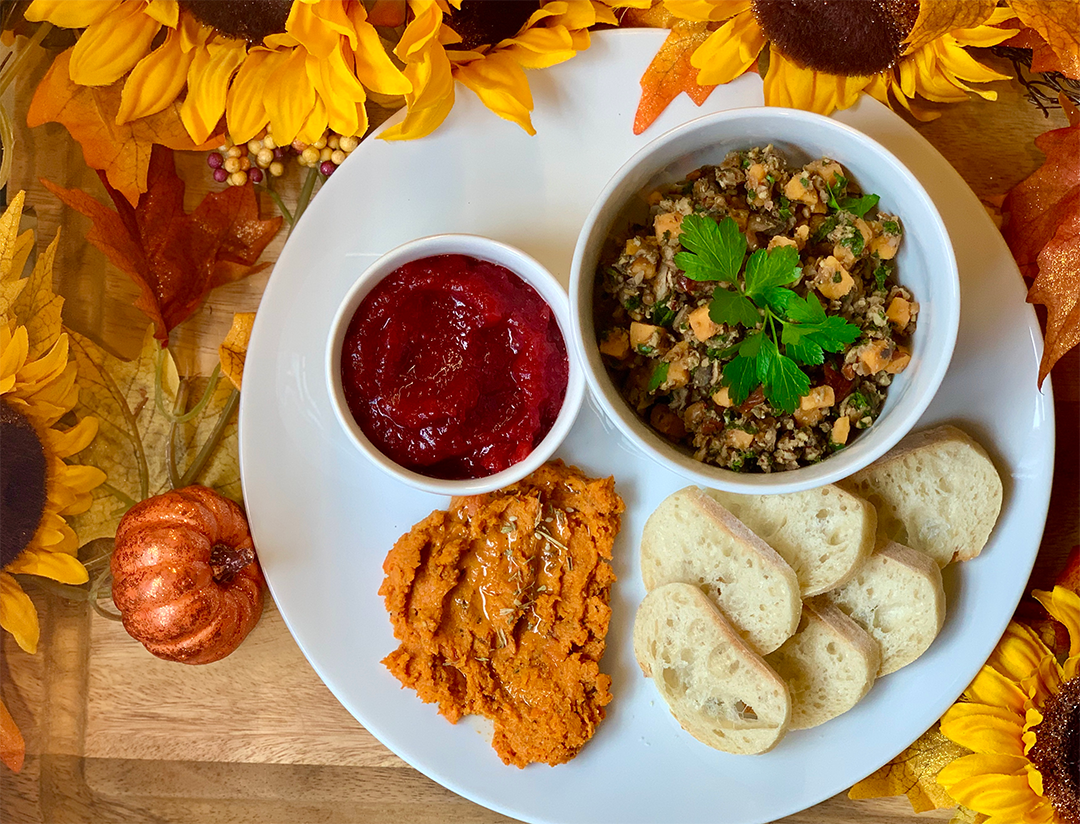
Dr. Lauren Carter’s 7 tips for eating with intention (and attention!) during the holidays:
1. Perspective: Keep the meaning of the holiday season in mind. It can be easy to equate the holidays with food; however, the holidays mean much more than that. Above all, it is a season of togetherness, connectedness, and shared joy. Whenever you get together with others during the holidays, try to put the focus on connection rather than food. With intention, focus the meaning of your gatherings on connection rather than what is on your plate.
2. Be Flexible. This year is a great opportunity to practice flexibility in thinking and acting with regards to connection. Rather than focusing on connecting over food, can you plan some other activities that foster connection and joy where food isn’t the focus? For example, could you plan some extended family Zoom time, sing carols, or play a family game that lifts everyone’s spirits? Could you plan a physically distanced get together in an outdoor space or bring several family members together to sing outside of an older family member’s window? On Christmas Eve, could you and your neighbors gather outside and ring bells for a few minutes to help spread holiday spirit and help Santa fly the sleigh?
3. Plan ahead and set SMART goals. Set yourself up for success by thinking ahead and planning for what your healthy priority is. Often times, individuals set healthy eating goals in terms of the number on the scale, but healthy eating is much more than that. Setting yourself up for success when it comes to goal setting may be best achieved if you make a SMART goal—one that is Specific, Measurable, Attainable, Realistic, and Time Bound. For example, rather than stating “I don’t want to gain too much weight over the holidays”, you might set specific SMART goals, such as taking a 20-30 minute walk after dinner on 4 out of 7 nights per week over the next month or getting 8 hours of sleep on at least 5 out of 7 nights per week.
4. Choose foods that are nourishing and satisfying. As Hippocrates said, “let food be thy medicine and medicine be thy food.” Eat foods that help you meet your body’s needs, so that you feel better when you’ve finished eating than you did when you started.
5. Balance and moderation. While you will feel best if you primarily eat foods that nourish your body, it is also important to make sure you do not feel you are restricting or depriving yourself from holiday foods. Keep moderation in mind. For example, perhaps it is tradition for you and your family to decorate your home while sipping hot apple cider and enjoying freshly baked cookies. Mindfully (see tip #6!) and intentionally engage in this tradition. If you enjoy the hot apple cider and cookies mindfully, chances are you will do so while listening to your body’s cues and wholly throwing yourself into the joy of engaging with your family in this tradition, without over-consuming.
6. Eat mindfully. Mindful eating means eating with intention and attention. As you eat, slow down and take the time to tune into the ambiance, flavors, colors, aromas, textures, and temperature of the food.
7. Listen to your body’s cues of hunger and fullness. Eat when your body is hungry, check in with your internal hunger and fullness thermometer, and stop when you are full. This is easiest to do when you limit distractions while you are eating. For example, it is difficult to gauge hunger and fullness if you are eating while driving or eating while watching television. As best you can, try to always eat while sitting at a table with limited distractions.
As you mindfully apply some of these tips, keep in mind that practice makes better (not perfect!). One success breeds future success. So, even if your current relationship with food seems far off from the tips listed above, take comfort in knowing that you can help move towards a more mindful and intentional relationship with food one meal (or snack) at a time.
By Lauren Carter, Ph.D and licensed clinical psychologist
Let's Talk